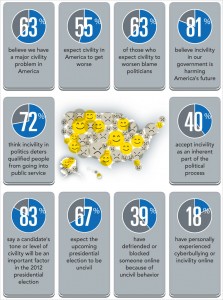This shouldn’t come as a big surprise, but a new study has found that a large majority of Americans feel that civility remains a “major problem” in our society.
Weber Shandwick and Powell Tate partnered with KRC Research to conduct its third annual poll on Civility in America: A Nationwide Survey. The key finding was that nearly two-thirds (63 percent) of the American people believe incivility is a “major problem,” and that nearly three-quarters (71 percent) believe that civility has deteriorated over the past few years.
It’s politics that seems to be fueling the worst of our civility problems, with about eight in 10 Americans saying political campaigns are uncivil and politics is becoming more uncivil.
Tearing down public discourse
Of greater concern is this: substantial majorities think the tone of our public discourse is harming America’s future, deterring qualified people from entering public service, and preventing Washington from getting things done. And, some 69 percent believe last year’s budget talks broke down because of uncivil behavior by the negotiators.
The increasingly uncivil tone of our public dialogue is hurting our ability to deal with issues and discouraging people from participating in the discussion and entering public life. We are suffering from a national civility disorder that is leading us down an unhelpful and unhealthy political path,” said Pam Jenkins, President of Powell Tate, in a press release about the survey.
 None of the findings in this survey should come as any great surprise to most people, because we see this uncivil behavior all around us, especially in our lives at work. And although the Civility in America survey didn’t specifically focus on the workplace, there were a few nuggets here and there concerning uncivil workplace behavior.
None of the findings in this survey should come as any great surprise to most people, because we see this uncivil behavior all around us, especially in our lives at work. And although the Civility in America survey didn’t specifically focus on the workplace, there were a few nuggets here and there concerning uncivil workplace behavior.
Incivility in the workplace
Some examples:
- When asked to to rate the general tone and level of civility of a broad range of groups, media outlets and individuals, political campaigns were rated as having the highest level of incivility at 76 percent, with government right behind at 69 percent.
- Respondents rated the level of incivility in the workplace at 31 percent — the same as the level of incivility they see on MSNBC and CNN.
- Some 34 percent of Americans say they have personally experienced incivility at work (although that was down from 43 percent last year).
- And, over two out of 10 (23 percent) say they have quit a job because of incivility at work.
As the survey’s Executive Summary notes:
Since June 2010 when we released our first study, there has been a 140% increase in online mentions of “civility.” These figures may rise even further in the months ahead as the political season gets underway and civility takes a front seat on our national stage.
Yet, despite all the discourse about civil discourse, and some encouraging signs of slight improvements in civility, there remains ample data demonstrating that our society, especially our political environment, remains rife with destructive behavior. And anecdotal evidence as well: The founder of an effort to promote civility in politics, the Civility Project, called it quits when only three elected members of Congress agreed to sign a rudimentary “Civility Pledge.”
The 2012 Civility in America survey was conducted online in April among 1,000 American adults to assess attitudes towards civility in politics and in other aspects of American life. It is the third year the survey has been conducted.
Some hope for the future
I wrote about bad behavior in the workplace nearly year ago, when a study found, among other things, that 86 percent of workers at three companies in the Midwest reported bad behavior on the job. The difference now, according to the Civility in America study, is not only that the problem continues but that Americans are bracing for more uncivil behavior due to the blossoming presidential campaign given that they see politics at the heart of the civility problem.
Be warned: reading Civility in America is a bit depressing, although really, it only is reinforcing and putting some context around what you already know and have probably experienced yourself. There is a glimmer of hope for the future, however, as the survey notes:
When comparing results for 2011 and 2012, there is some reason to be optimistic. Fewer Americans are mentioning that they are experiencing these acts of incivility while driving, shopping, working or in their neighborhoods compared to one year ago. …
This glimmer of hope that people are experiencing less incivility in their lives was seen in other results from the survey. Approximately four in 10 Americans have ended a relationship because another person was uncivil (44 percent) or have defriended or blocked someone online because of their uncivil commentary (39 percent).
Over two out of 10 (23 percent) have quit a job because of incivility in the workplace and one in 10 (13 percent) have moved residences because of an uncivil neighbor. Although these are all unpleasant things to have to do, Americans appear more willing to take charge of eradicating incivility in their day to day lives.
There is little Americans can do to change the political climate of incivility. However, they can control the incivility in their own lives. The research may be demonstrating this shift in empowerment.”
